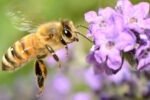By: Er. Prabhat Kishore
“If the bees disappeared from the surface of the globe the man would only have four years of life left. No more bees, no more pollination, no more plants, no more animals, no more man.”- Albert Einstein.
World Bee Day is celebrated every year on 20th May. This day is intended to generate awareness about importance of Beekeeping activities in increasing yield of various agricultural and horticultural products and providing income and employment support.
Beekeeping activities are being carried out by farmers in rural areas under Integrated Farming System (IFS). Honeybees are one of the best pollinators which enhances the yields and quality of produce of various crops such as fruits, vegetables, pulses, oil seeds, etc. through pollination support. They are vital for the preservation of ecological balance and biodiversity in nature. By sucking on the nectar of flowering plants, bees spread pollen to other plants and help with the fertilization process. About 85% of plants exist because of bees and one-third of all food we eat depends on pollinators. Bees pollinate nearly 70 to 100 types of crops.
Beekeeping provides income and employment to the rural people by way of increasing yield of various crops along with providing honey & other beehive products, such as – bees wax, propolis, pollen, royal jelly, comb honey, bee venom, etc. which have great importance in human life. Therefore, honeybees/beekeeping is being treated as one of the most important 5th input for sustainable development of agriculture/horticulture.
Keeping in view the importance of beekeeping, GOI has approved a central sector scheme “National Beekeeping & Honey Mission (NBHM)” (100% funded by Central Government) for overall promotion and development of scientific beekeeping in mission mode to achieve the goal of “Sweet Revolution” in the country. The Mission will have 3 sub-schemes/Mini Missions (MMs)-MM-I, MM-II, MM-III.
Under MM-I, thrust will be given on production & productivity improvement of various crops through pollination assisted by adoption of scientific beekeeping. Integrated Beekeeing Development Centers (IBDC), honey testing labs, bee disease diagnostic & treatment labs, Api-therapy centers and other infrastructure will be set up. This will also include development of nucleus stock & bee breeders, Custom hiring centers, digitization/online registration & insurance, promotion of bee friendly plants/ flora/bee gardens, involvement & empowerment of women etc.
MM-II will concentrate on post-harvest management of beekeeping/beehive products including collection, processing, storage, trading, branding, marketing, value addition, packaging, etc. with a thrust to requisite infrastructure facility for these activities. MM-III will be responsible for Research & Technology generation for different Regions/States/Agro-Climate and Socio-Economic conditions.
GOI has approved Rs 500 Crore for beekeeping initiatives under Atma Nirbhar Bharat programme for NBHM for 3 years (2021 to 2023). National Bee Board (NBB) has been designated as a Nodal Agency for overall development/ promotion of scientific beekeeping in the country.
The main theme of celebrating World Bee Day this year will be “Bee engaged in pollinator-friendly agricultural production”, because saving the bees leads to saving the plants & food and ultimately life on the earth. Having usage of honey & other beehive products in daily life, their importance in human health and dependency of world agriculture/horticulture on bees as pollinators, mass-scale awareness campaigns are being organized by various departments & institutions, Beekeeping helps in prosperity of farmers, healthy people & strong nation and all citizens must give their support for preservation of this life saving creature. (The author is a technocrat and academician & he can be reached at prabhatkishore65@gmail.com)







